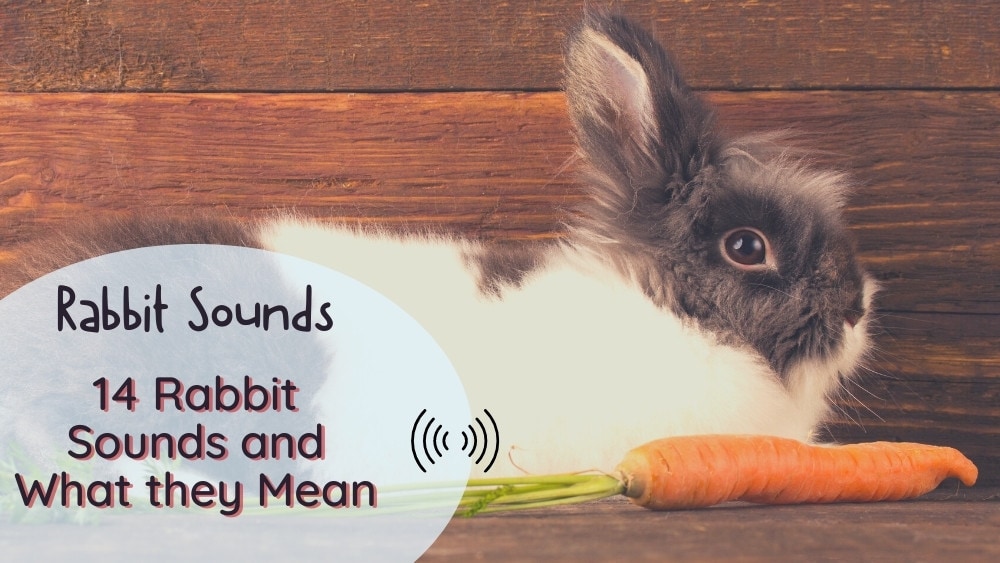Perhaps you’ve heard that “rabbits are silent creatures.” But you probably weren’t far into your bunny-keeping career when you discovered that’s not true.
Rabbits are definitely quiet creatures. With the exception of a terrified rabbit’s death scream – which most bunnies never even utter – rabbit noises are soft, subtle, and hard to catch. But rabbits have a vocabulary of clucks, grunts, and nasal noises that speak volumes about how they are feeling.
Ready to learn the secret language of rabbits? Well, future Bunny Whisperer, read on.
Do Rabbits Make Noises?
Rabbits do make noises – though most of them are hard to hear. Bunnies may cluck or chatter when they are happy. They honk or “oink” when they’re excited. And they may grunt, growl, stamp their feet, or scream when they are distressed. Finally, sneezing, wheezing or teeth grinding can point to illness in your bunny.
14 Rabbit Noises and What They Mean
If you watch videos of rabbit vocalizations on Youtube, you’ll discover that bunny parents haven’t agreed on consistent names for the noises rabbits make. Should we call that nasally sound a buzz, purr, grunt, or cluck?
Each rabbit has its own voice and expresses itself a little differently. But after raising rabbits for 22 years, I’ve personally heard and can recognize at least 13 distinct rabbit sounds with their associated body language and emotions. We’ll look at them in this list.
Happy or Normal Rabbit Noises
1- Clucking
“Clucking” is a very soft sound that not every rabbit makes. But, as you can hear in the video above, it sounds just like a mother hen clucking away contentedly. Happy rabbits may make this noise when enjoying a meal or a grooming session.
2 – Tooth Purring
“Tooth purring” may strike you as a strange name for this behavior, but it fits. This bunny noise sounds like a cat’s purr, but rabbits create it by chattering their teeth together rapidly. In some bunnies, you may see or feel the motion more than hear the sound of it.
Rabbits make this noise when they’re feeling relaxed and without a care in the world. They’ll make it when hanging out in a side-lying or “bunny loaf” position, or when you’re petting their favorite spot between their ears. This is one of the most common rabbit sounds.
Important! Compare the two videos below. I had to dig through a number of them on Youtube to find one that accurately labeled this behavior. The first video shows a happy rabbit tooth purring.
The second one, although it’s labeled as “rabbit purring,” actually shows a rabbit that is overheated and stressed. The bunny’s nose is moving very quickly in the second video, but that is a sign of distress – not tooth purring.
Rabbit Purring – Happy rabbit “purring.” The teeth are moving quickly, but notice how little the nose is moving. Slow breathing is a good sign.
RABBIT PURRING – Distressed rabbit, not purring. The teeth are not moving. The nose is moving very quickly, signaling stress and overheating.
3 – Buzzing
Rabbits that “buzz” are usually boys bunnies hoping to make some babies. You won’t hear this sound very often from females or neutered males. However, bunnies may make this nasal buzz if they’re really, really eager for pleasure of another kind, like their favorite treat.
4 – Honking or Oinking
Honking or “oinking” is a guttural sound that rabbits make when they’re excited. Rabbits usually make this noise while running around the living room – or running circles around your feet. It can be a territorial sound, especially in rabbits that haven’t been spayed or neutered. But it also can simply express happiness and confidence.
5- Hiccups
Can rabbits get hiccups? It sounds almost too cute to be true, but they can. If you notice your rabbit twitching at regular intervals while lying flopped over on its side, don’t worry. It might just have hiccups! The hiccups may or may not come with adorable little squeaks.
6- Sleeping Noises – Snoring
Do rabbits snore? They can! If you have a house rabbit, you may notice him making little snuffly or snoring noises when passed out in a deep afternoon snooze.
This isn’t necessarily a health concern unless it arises suddenly in a rabbit that didn’t snore before. Remember, rabbits are light sleepers, especially when there are people around, so you may never see them snore.
7 – Squeaking – Baby Rabbit Sounds
Most adult rabbit noises are breathy nasal sounds. However, newborn baby bunnies use their voiceboxes all the time!
A nest of newborn baby rabbits is warm, wiggly, and very squeaky! Baby bunnies squeak constantly as they jostle their littermates in the nest and scramble for positions to nurse. It’s so, so cute to watch. Unfortunately, newborn rabbits outgrow their squeaky stage by two weeks of age.
Distressed Rabbit Noises
8 – Growling or Grunting
Grunting is usually the sound of an angry rabbit – though I have had silly, self-important bunnies that would grunt at me over a minor annoyance, like if I didn’t pet them long enough.
This loud, throaty growl is a continuous sound, rather than honking or buzzing, which are short, clipped sounds. The growl may grow louder and more intense if the rabbit doesn’t get its way.
A grunt or growl may mean that the rabbit is angry enough to bite. It’s often used with flattened ears, lunging, or other aggressive body language.
If your rabbit is normally friendly and outgoing, but suddenly begins growling at you, you should consult a veterinarian. Rabbits try to hide their symptoms when they are sick, and sudden aggression may be warning you of a health issue.
9 – Rabbit Crying or Whimpering
Whimpering or crying is an escalated grunt or growl. The rabbit making this sound has already warned you by growling that it didn’t want to be touched. If you ignored the warning and touched the rabbit anyway, the grunt may turn into a high-pitched whine.
In the video below, the rabbit begins growling, but the growl increases to a cry when the person tries to pick up the bunny a second time. This rabbit may be frightened, uncomfortable (perhaps pregnant), or have an underlying health issue.
10 – Hissing
In most cases, rabbits would rather run than fight. But if faced with a cat, dog, or unwanted human hand approaching them, rabbits may have to go on the offensive. They may hiss while lunging at the predator or perceived predator.
Be careful! A rabbit that hisses at you is willing to bite.
11 – Loud Squeal or Scream
I hope you never have to hear a rabbit scream. Adult rabbits only scream in extreme fright or pain. This very loud, very high-pitched alarm will make your blood run cold and send every rabbit that hears it into a frenzy of foot-stamping.
Sometimes baby rabbits (under 6 weeks old) will scream over much smaller offenses, such as getting pushed aside by an older sibling. (They’re toddlers, after all!) But if you hear a baby rabbit scream, check to make sure there are no bite wounds.
Trigger warning: the video below shows a rabbit screaming when it’s handled roughly. There are several unkind and dangerous rabbit-keeping practices shown in this video, so we offer it with caution and for informational purposes only.
12 – Foot Stamping
Rabbits sound the alarm by stamping their powerful hind legs. This makes a surprisingly loud noise on hard floors! Rabbits may stamp several times in a row, usually with a 5-second pause in between thumps.
Stamping or thumping means your bunny is scared and is warning other rabbits of danger.
Sudden noises or the sight of a hawk may make your rabbit thump its feet. I’ve had rabbits panic and stamp when I walked into the room carrying an unexpected object, like a trash bag. In the video below, the rabbit was so nervous at the sight of the camera that it began thumping.
Rabbit Noises that Indicate Health Concerns
13 – Sneezing, Wheezing, or Coughing
If you hear your rabbit sneeze, stop and pay attention. Sneezing may be cute, but if there’s white or opaque mucous in your rabbit’s nose along with sneezing, this could be a sign of a common but serious rabbit illness called snuffles or pasteurellosis.
If your rabbit sneezes multiple times a day, and if you see any discharge at all from the nose, call a veterinarian. Likewise, if your rabbit is wheezing or seems to have trouble breathing, call a vet. This could be a heart or respiratory problem.
That said, some bunny sneezes are completely benign. A rabbit might sneeze from dust or a tickle in its nose, just like we do. If rabbits accidentally get water up their nose from drinking, this can send them into a sneezing fit.
14 – Teeth Grinding in Pain
Teeth grinding is a completely different behavior than tooth purring. As described in #2, rabbits express happiness by chattering their teeth quietly. However, the sound of a rabbit grinding its teeth is loud and jarring. Rabbits grind their teeth if they are in pain. The only time I’ve ever heard this was in a poor elderly bunny suffering from GI stasis.
If you see your rabbit sitting in a hunched position and grinding its teeth, offer it critical care formula and call a veterinarian right away.
Closing Thoughts
Although rabbits are far from noisy, they use vocalizations to express their complex emotions and personalities. As you spend time with your rabbit, you’ll learn its language – from buzzing to grunting – and the physical behaviors that go with each sound.
Did any of these rabbit noises surprise you? What sounds does your rabbit make? We’d love to hear your comments!


